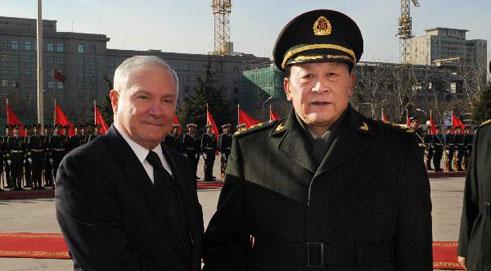
Chinese Defense Minister Liang Guanglie (R) shakes hands with the visiting U.S. Secretary of Defense Robert Gates at a welcome ceremony in Beijing, capital of China, Jan. 10, 2011. (Xinhua/Li Tao)
BEIJING, Jan. 10 (Xinhua) -- China and the United States agreed to avoid misunderstanding in developing military ties amid U.S. Defense Secretary Robert Gates' visit to Beijing to restore impaired high-level military exchanges.
In their official talks on Monday, Chinese Defense Minister Liang Guanglie and Gates reached consensus on joint efforts to expand common interests, deepen dialogue and exchanges, and avoid misunderstanding and miscalculation to ensure military ties back on the sound track.
They pledged to keep open the channel for exchange mechanism like defense and maritime security consultations between the two militaries.
"There are many areas where we have mutual interests and can work together, those disagreements are best dealt with through dialogue and discussions with one another," said Gates.
His visit, which came ahead of Chinese President Hu Jintao's state visit to United States later this month, was one of the scheduled high-level contacts that were postponed after the Pentagon decided to sell a nearly 6.4-billion-U.S.-dollar arms package to Taiwan in January of 2010.
While reaching agreements on developing resumed military exchanges, the Chinese defense chief warned that U.S. arms sale to Taiwan "jeopardizes China's core interests."
"We do not want to see such things happen again. We do not want U.S. weapon sales to Taiwan to further damage the relationship between China and the United States and the two nations' armed forces," Liang told a press briefing.
On a question on the development of China's military power, Liang rejected claims that China's military development is a threat, saying its weapons still lag far behind developed countries.
"China's military hardware development is to meet its sovereignty and security requirements and targets no other countries and poses no threat to others," said Liang.
Chinese Vice President Xi Jinping, while meeting with Gates later on Monday, stressed "reliable political basis" for Sino-U.S. military ties, which have gone through ups and downs in the past years.
Xi, also vice chairman of China's Central Military Commission, urged the two militaries to take measures to safeguard the "stable and reliable" political foundation, that is, mutual respect for sovereignty, security and development interests.
"China-U.S. military relationship, as an important part of bilateral ties, is a sensitive field with more complicated factors," said Xi, hoping military-to-military relations could move forward in a healthy and stable manner.
Another Vice chairman of China's Central Military Commission Xu Caihou made a three-point proposal on developing China-U.S. military ties, in his meeting with Gates.
Xu called on to respect and accommodate each other's core interest and major concern, to cultivate and increase strategic trust between the two armed forces, and to consolidate and expand common interests for both sides.
Calling U.S.-China relations the "most important" bilateral ties in the world, Gates told Xu that his visit achieved "important progress" in building stable military ties between both countries.
Gates said his country was expecting President Hu's state visit. Hu is due to meet with Gates on Tuesday.
"China-U.S. military exchanges plays an irreplaceable role in solving deeper differences between the two countries," said Zhu Feng, an researcher on China-U.S. relations with Peking University.
He said the military contacts would greatly help to beef up strategic trust between China and the United States, and also influence public opinion.
Gates will visit the command of the Second Artillery Force of the PLA on Wednesday. This is his second China trip since he took office in December 2006.
Source: English.news.cn
Related News
Photos
More>>trade
- Senior Chinese Official Encourages Jurists to Participate in Legislation, Better
- Chinese in New York Celebrate Spring Festival, Presenting Traditional Culture
- DPRK Leader Meets Chinese Senior Official
- Chinese Vice President Stresses Integrity-first Criteria in Electing Communist
- Chinese Premier Urges More Efforts to Boost Grain Production
market
finance
- Chinese Vice Premier Calls for Building of 10 Mln Affordable Housing Units This
- China to Fulfill Duty as Rotating Security Council President in Fair, Neutral
- Chinese Vice Premier Vows Closer Co-op with Austria
- Chinese, Austrian FMs Vow to Step Up Bilateral Ties
- Chinese Vice Premier Urges Sound and Fast Development of Tourism Industry





